EYE OF THE BEHOLDER
By | Fall 2019
MBA STUDENT'S STARTUP EMBRACES 'UGLY' FRUIT AS A FIX FOR A BROKEN FOOD CHAIN
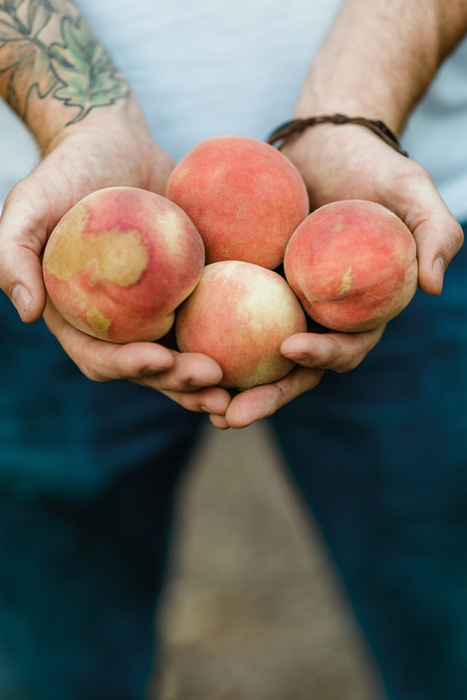 Consider the peach.
Consider the peach.
The hues of sunrise, taste of nectar. Fragrant and fragile. Summer in a velvet skin.
Also, pricey. A box of peaches at Walmart runs about $2 a pound when the season is high. Out of season? Good luck.
Yet, day after day during harvest seasons, Ben Moore’s job was to dump 25 to 150 tons of perfectly edible peaches on the ground to rot.
In a YouTube video, Moore (MBA ’20) drives his tractor through an orchard, leading a wagon train of trailers filled to the brim with fruit. He casually reaches back to the trailer behind him, picking up peach after peach, enumerating their flaws: too small, a tiny gash in the skin, slightly misshapen, and seemingly nothing at all. He arrives at a bare field, and with a tip of the trailer, 50,000 pounds of fruit slides into a trench. That’s one of 40 to 80 loads that were dumped near Kingsburg, California, on just one day — May 18, 2019.
“A day just like every other day in harvest season,” said Moore, surveying the mountain before him.
Facing piles of food literally lying in the dirt has a way of making the problem of food waste in America very real. Add to that the news coverage of food shortages in Puerto Rico after Hurricane Maria hit in 2017, and a paradox presented itself to Moore: massive waste on one side, massive need on the other.
For Moore, it became increasingly apparent that a business solution that linked the two sides together was needed. That solution involved embracing the less-than-perfect, and The Ugly Company was born.
PICKY EATERS
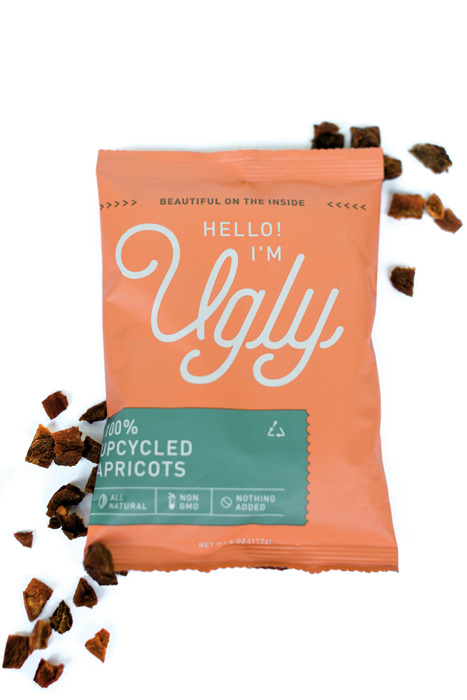 In a nutshell, Moore founded The Ugly Company to transform perfectly good fruit that was rejected by retailers into dried fruit snacks that are non-GMO and contain no preservatives or added sugar. Sold on Ugly’s website as well as in higher-end coffee shops and markets in the Los Angeles area, a three-pack of dried apricots, peaches or kiwi sells for $18. By next season, the company plans to add white nectarines and pears to the product offerings.
In a nutshell, Moore founded The Ugly Company to transform perfectly good fruit that was rejected by retailers into dried fruit snacks that are non-GMO and contain no preservatives or added sugar. Sold on Ugly’s website as well as in higher-end coffee shops and markets in the Los Angeles area, a three-pack of dried apricots, peaches or kiwi sells for $18. By next season, the company plans to add white nectarines and pears to the product offerings.
The reason the fruit was rejected by wholesale buyers starts to get at the root of the problem of food waste. Each major food retailer has a list of specific criteria the fruit must meet before they deem it sellable to their respective customers. And American consumers can be pretty picky when it comes to how their food looks.
“Our goal is to reduce the supply of ugly produce that’s thrown out by reconditioning consumers to value produce for its taste rather than its appearance through our brand and message,” said Moore. “Currently, as visual standards get tighter, more fruit is grown is to meet market demand, and a higher percentage of fruit thrown out. The percentage of fruit thrown out steadily increases as consumers become more disconnected from their food source. If we can reconnect people to farms, then we can recondition the way people value produce.
“Our second goal is to create demand for the produce that’s being thrown out. Our products are all made from produce that was sorted out that was going to become waste.”
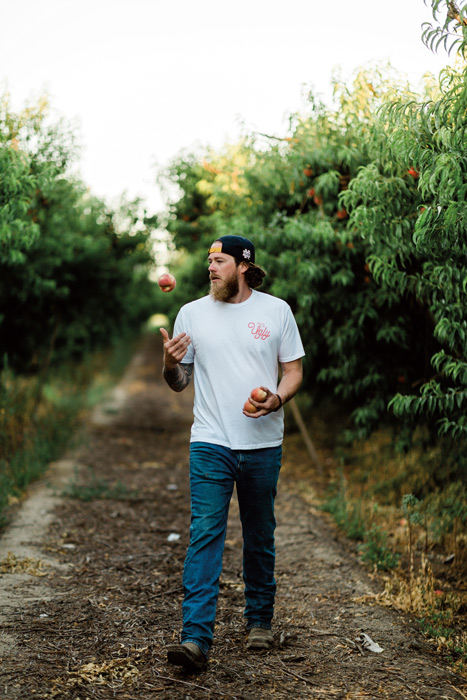 Moore grew up on a fourth-generation family farm that grew grapes for wine and raisins and stone fruit in Kingsburg. After joining ROTC as an undergraduate at Azusa Pacific University, a small school in Los Angeles, he went into the Army for a few years before he injured his back and leg.
Moore grew up on a fourth-generation family farm that grew grapes for wine and raisins and stone fruit in Kingsburg. After joining ROTC as an undergraduate at Azusa Pacific University, a small school in Los Angeles, he went into the Army for a few years before he injured his back and leg.
When he moved home, he realized the difficult plight for family farms in California and that it just wasn’t possible for him to make a living there. So he started a heavy hauling company, transporting bulldozers and excavators, and later aggregates and recycled asphalt. Eventually, he also began bulldozing vineyards and orchards and hauling tons of unsold fruit to the bare fields outside Kingsburg.
He launched The Ugly Company in 2018 after spending 18 months researching the problem of food waste on farms to better understand the causes. Moore was inspired by the thought of sending preserved food that can be readily stored and transported, similar to the military’s Meals Ready to Eat (MREs), to areas hit by disasters such as Puerto Rico and Venezuela. But he realized that to scale up operations, he would need to function as a for-profit, and in tandem, that he wanted to earn his MBA. He understood the farming end of the business, but to grow it the way he envisioned, Moore wanted to learn business fundamentals such as accounting and finance. Following up on a suggestion from a few military friends, he chose Notre Dame.
“The University’s values and business school’s mission were my main reasons for choosing ND over other schools,” he said. “The school’s values, my personal values and the company’s values all align perfectly.”
SUPPLY AND DEMAND
For all of his passion to reduce waste, Moore also knew from his farming background that the solution was more complicated than just convincing people to eat blemished food. “Nobody’s really to blame here,” he said. “It’s just that the economics don’t work.”
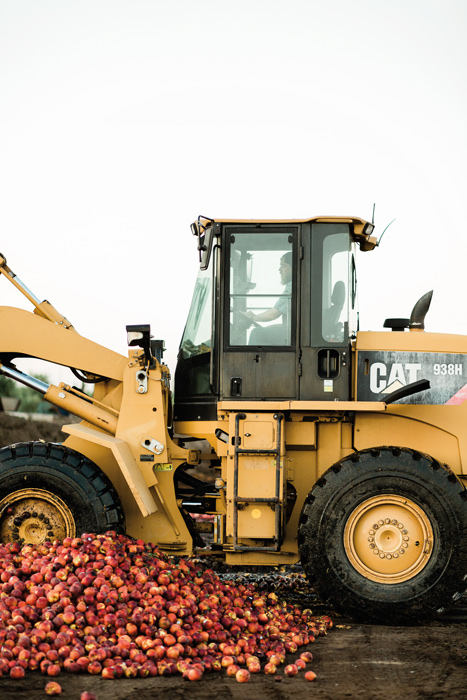 To be sure, farmers today face all of the challenges that farmers have faced since the beginning of time — weather that’s too hot or too cold, too much rain, not enough rain, storms, hail, floods, insects.
To be sure, farmers today face all of the challenges that farmers have faced since the beginning of time — weather that’s too hot or too cold, too much rain, not enough rain, storms, hail, floods, insects.
The real complications, however, are in the supply chain. “In California especially, technologically, we produce so much per acre and we farm in such an optimized way because it’s so expensive to have a business in California,” Moore said. “We can produce this incredible amount of food, but now most of the canneries and dehydrators are closed down in part due to the rise in labor costs, international competition and other inflated operating costs associated with doing business in California.”
In 2016, the state passed legislation to incrementally raise the minimum wage to $15 an hour by 2023. It currently stands at $12 per hour for employers with 26 or more employees compared to the federal minimum wage of $7.25.
“All the infrastructure for processing commodities at scale either doesn’t exist or we generally can’t do it cheaper than another country,” he said. For example, apricots grown specifically to be dried and processed can be cut, dried, processed and shipped to California for about $2.50 per pound. But it costs at least $3 per pound just to dry the apricots grown in California, said Moore. “So ugly apricots in California get tossed out and the cheaper imports from Turkey get brought in.”
The Ugly Company’s business model is to create demand for wasted fruit by turning it into a snack product that is transparently branded as ugly. There’s an important distinction to note: The company is not trying to compete in the fresh fruit market by selling the rejected fruit at a discount to consumers via alternate channels, as other ventures do.
In Moore’s view, those efforts — although admirable in intention — often negatively affect the marketplace for fresh fruit and ultimately fail to address the root issue of food waste — the fact that the marketplace values produce’s appearance over its taste. Introducing the so-called ugly fruit back into the marketplace, even at a reduced cost, still puts pressure on the supply chain, essentially devaluing the entire marketplace because consumers don’t necessarily buy more fruit when it’s discounted. So farmers have to ship more fruit at a lower margin when ugly fruit is sold for a discount, said Moore.
“The demand for the commodities is nowhere near the supply,” said Moore. “The economics of it is what causes the waste. With our plan, our products don’t compete with the top-grade fresh fruit. It’s a snack product — another category entirely. Making good healthy products that consumers want creates demand for food that previously would have become waste.”
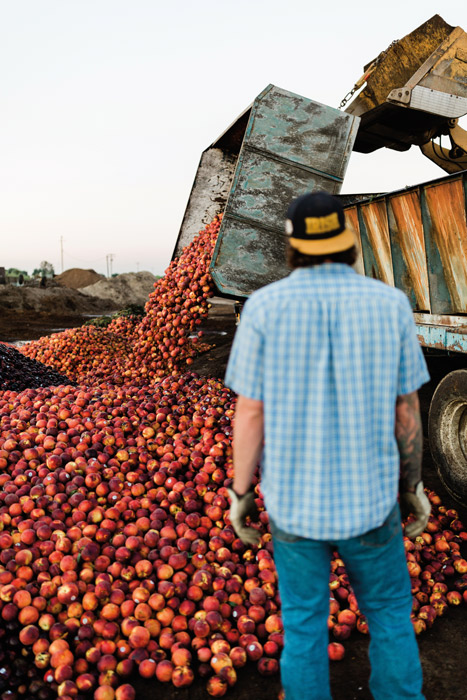 Moore acknowledges that the challenges are formidable since the solution involves essentially rebuilding an entire supply chain in order to scale up the business. Currently, he buys the fruit from small farm operators, takes it to a nearby dehydrating plant where it is cut, dried and packaged. Then the product is put in cold storage until it is ready to ship. It’s available online and sold in about 40 independent grocery stores near L.A. He hopes to sell Ugly Company products in national chains eventually.
Moore acknowledges that the challenges are formidable since the solution involves essentially rebuilding an entire supply chain in order to scale up the business. Currently, he buys the fruit from small farm operators, takes it to a nearby dehydrating plant where it is cut, dried and packaged. Then the product is put in cold storage until it is ready to ship. It’s available online and sold in about 40 independent grocery stores near L.A. He hopes to sell Ugly Company products in national chains eventually.
He’s brought some ND help on board: Two MBA students — Dan Weissenhofer (MBA ’20), who interned with Ugly Company full time in summer and is still working part time, and Nishtha Kaushik (MBA ’20), who helped with product development, digital marketing and the website. Two undergraduates, accounting major Haley Christian (BBA ’20) and Elizabeth Finnerty (ND ’20) are working on a sustainability capstone project focused on marketing The Ugly Company on college campuses.
Moore noted one additional trend that holds promise for saving more “ugly” fruit is the rising popularity of farmers’ markets. “Younger people especially love farmers’ markets. What’s interesting — and kind of funny — is that the peaches, nectarines and plums sold at the market usually come from the same tree as the fruit sold in the grocery store. But at the market, they’re selling ugly fruit at a premium.”
Photos by Megan Helm Photography

Comments